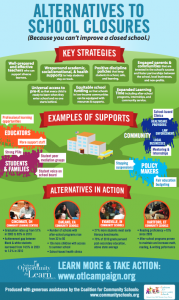 Fortunately, many grassroots activist organizations based in urban settings are fighting back against school closure. For this website, I selected grassroots organizations based in Chicago, New York City, Philadelphia, and Washington, D.C. because these four cities have large school districts, large populations of low-income students of color, complicated public school governance structures, frequent school closure proposals, and activism at all levels (community members, students, teachers, parents, advocates, professors, researchers, and others) against school closure.P8
Fortunately, many grassroots activist organizations based in urban settings are fighting back against school closure. For this website, I selected grassroots organizations based in Chicago, New York City, Philadelphia, and Washington, D.C. because these four cities have large school districts, large populations of low-income students of color, complicated public school governance structures, frequent school closure proposals, and activism at all levels (community members, students, teachers, parents, advocates, professors, researchers, and others) against school closure.P8
Many of the grassroots organizations fighting against school closure:
*believe the costs of school closure outweigh the benefits,
*privilege public institutions over private institutions,
*believe in equitable school funding particularly for high-needs communities,
*rally against disinvestment in struggling schools,
*promote anti-racist practices and curriculum,
*believe strongly in the connection between neighborhoods/communities and their local schools,
*value student and community voices in education and school decision making,
*are social, racial, and economic justice-oriented in their work,
*oppose racially-targeted school closure on principle
*and cherish the rich resources of local communities.
School closure exists as a school/community-specific issue and as a macrolevel issue when considering diminishing public institutions and expanding charter schools and nonpublic institutions. Even though small “victories” may be achieved in particular communities when school closures are prevented and public schools are invested in and valued, if school closure proposals continue to arise in school boards and districts around the country, this indicates a more significant issue and presents evidence that many people believe that public education is a failed institution.
Grassroots activists face many challenges, including school board and district officials who do not genuinely listen to community perspectives, private and corporate interests attempting to capitalize on the perceived failure of public institutions, continued inequity in school funding, and ingrained eugenic and racist ideology in society, among many others.
However, these grassroots activists did not and have not given up hope in public schools as institutions presenting the opportunity for community voices to be heard, for systemic inequalities to be examined critically and transformed, and for quality education and learning to occur.
